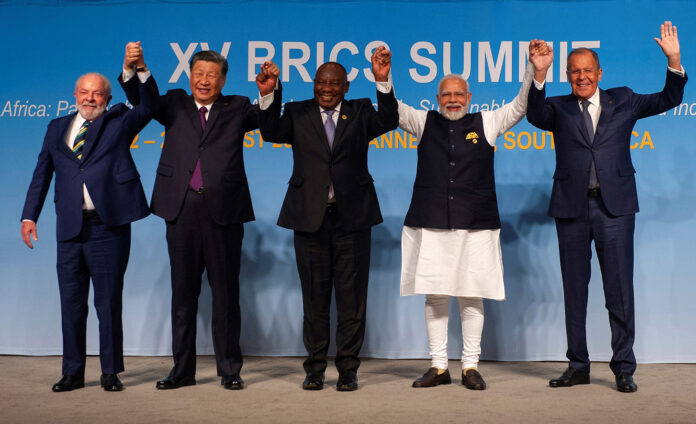With the curtains drawn on the XVII BRICS Summit in Rio de Janeiro, the bloc’s leaders have sounded a weighty alarm about the shifting sands of global stability.
In the Rio de Janeiro Declaration, BRICS (Brazil, Russia, India, China, and South Africa, plus their newer members) calls for peace, urgent diplomacy, and sticking to international law.
The bloc warns of surging global conflicts, ballooning military budgets, and the slow erosion of the international order.
The declaration, carrying the theme “Strengthening Global South Cooperation for a More Inclusive and Sustainable Governance”, places the search for peace and security at its heart.
Expressing their disquiet over the world’s growing fascination with arms, the bloc said: “We express alarm at the current trend that has seen a critical increase in global military spending, to the detriment of the provision of adequate financing for development to developing countries.”
Violations of international humanitarian law
BRICS’ prescription is “a multilateral approach that respects diverse national viewpoints and positions”.
Their commitment to dialogue and diplomacy is unambiguous, as they restate their position for the “peaceful resolution of international disputes through dialogue, consultation, and diplomacy” and drive home the foundational idea that “security among all countries is indivisible”.
The Rio Declaration grows yet more resolute on the subject of humanitarian breaches.
“We strongly condemn all violations of international humanitarian law, including deliberate attacks against civilians and civilian objects, including civilian infrastructure, as well as the denial or obstruction of humanitarian access and the targeting of humanitarian personnel.”
The leaders caution that such transgressions “not only intensify immediate suffering but also undermine prospects for lasting peace”.
Marking the quarter-century milestone of the Women, Peace, and Security agenda, the declaration reaffirms its relevance, saying the leaders pledge “the full implementation and advancement of the Women, Peace, and Security agenda” and underline “the importance of ensuring the full, equal, safe, and meaningful participation of women in decision-making at all levels of peace and security processes”.
Attacks on Iran condemned
The bloc is unequivocal in its stance on recent military actions and “condemn[ed] the military strikes against the Islamic Republic of Iran since June 13, which constitute a violation of international law and the Charter of the United Nations”, and noted its “grave concern over the subsequent escalation of the security situation”.
Turning to Palestine, the declaration expresses “grave concern about the situation in the occupied Palestinian territory” and condemns Israeli attacks on Gaza, obstruction of aid, and violations of international law, including starvation tactics.
It demands an “immediate, permanent, and unconditional ceasefire; the full withdrawal of Israeli forces; the release of all hostages; and sustained and unhindered access and delivery of humanitarian aid”, while affirming support for Palestinian statehood “based on the 1967 borders with East Jerusalem as its capital”.
Elsewhere in the region, the ceasefire in Lebanon is welcomed, even as violations are condemned, with a demand that Israel “withdraw its occupying forces from all of the Lebanese territory”.
For Syria, the declaration echoes support for “sovereignty, independence, unity, and territorial integrity” and a political solution while condemning terrorism and calling on Israel to withdraw from Syrian territory.
Humanitarian crises
On the question of mediation, BRICS takes notice of “relevant proposals of mediation and good offices … aimed at peaceful resolution of the conflict through dialogue and diplomacy”, expressing hope that these efforts will give rise to a “sustainable peace settlement”.
“African solutions to African problems” rings out as the bloc throws its weight behind the African Union’s leadership.
The leaders voice “serious concern over the severe humanitarian crises” gripping Sudan, the Great Lakes, and the Horn of Africa.
For Sudan, a familiar refrain returns: the demand for “an immediate, permanent, and unconditional ceasefire” and the guarantee of “sustained, urgent, and unhindered access to humanitarian assistance”.
The alarms are no less strident in Haiti. “Seriously concerned with the ongoing deterioration”, the bloc insists the crisis must yield to a “Haitian-led solution” and calls on the world to lend robust support.
On the spectre of terrorism, BRICS is unsparing, labelling such acts as “criminal and unjustifiable”, with pointed condemnation of the attack in Jammu and Kashmir.
The commitment is renewed: fighting terrorism “in all its forms and manifestations”, with a call for “zero tolerance for terrorism and reject[ion of] double standards”, and urging the long-stalled adoption of the Comprehensive Convention on International Terrorism.
Disarmament and non-proliferation
The declaration also affirms resolve against illicit financial flows, money laundering, and transnational crimes, stressing “the principles of the technical and non-politicised nature of international anti-criminal cooperation” and boosting anti-corruption efforts, including asset recovery.
With “concern about the growing risks of nuclear danger and conflict”, the bloc pushes for a revitalised agenda on disarmament and non-proliferation.
Preventing an arms race in outer space is front and centre, with endorsement for “negotiations to adopt a relevant legal multilateral instrument to ensure global security” and a welcome for the updated PPWT draft treaty.
PPWT stands for Prevention of the Placement of Weapons in Outer Space and the Threat or Use of Force against Outer Space objects.
As the world grows more tethered to digital infrastructure, BRICS reaffirms its commitment to an “open, secure, stable, accessible, peaceful, and interoperable ICT environment” under UN stewardship.
The bloc commends the adoption of the UN Convention against Cybercrime, calling on nations “to sign it at the earliest opportunity … and ratify it … in order to ensure its rapid entry into force”.



